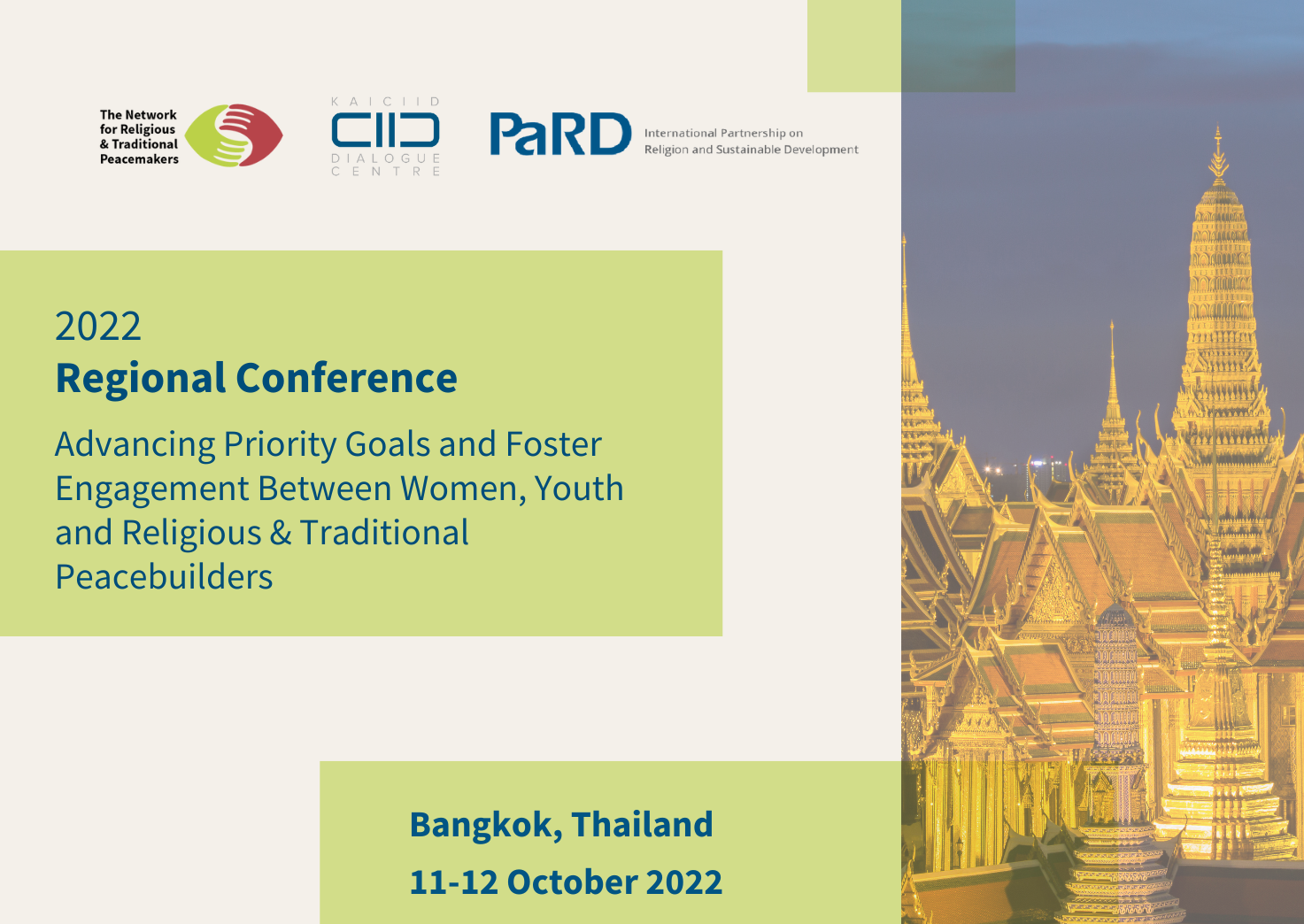Consultations to Advance Collaboration Between Women, Youth and Religious Leaders in South and Southeast Asia
September 2022
The Network for Religious and Traditional Peacemakers (NETW), the KAICIID Dialogue Centre, and the International Partnership on Religion and Sustainable Development (PaRD) will bring together women, youth, and leaders of religious communities from South and Southeast Asia in Bangkok, the advance of the upcoming G20 Interfaith Forum and subsequent G20 in Indonesia and India.
Building upon preceding online consultations, participants will gather in Bangkok to identify key policy suggestions and to strengthen these organizations in their abilities to inform policymakers and public opinion on matters like the climate emergency, the Covid-19 pandemic, and new technologies. The outcomes of this initiative will be shared with relevant policymakers, inform overall policy advocacy, and will be formulated into policy papers.
Consultations were held throughout late summer/early fall 2022 to capture challenges, opportunities, gaps, and best practices in relation to thematic focus areas of the G20 Interfaith Forum. During the first consultation, participants explored the challenges posed by the climate crises that reach far beyond direct environmental effects, threatening lives and disrupting livelihoods, posing challenges such as scarcity of resources and worsening the already widespread food shortages.
The second consultation explored changing dynamics within peace technology and hate speech. Addressing hate speech is crucial to prevent armed conflict, atrocity crimes, and terrorism, and to end violence against women and vulnerable groups. Online hate speech and misinformation have underlined the importance of promoting global citizenship, tolerance, and acceptance of diversity digitally, and exploring innovative ways to utilize technology for peace rather than violence. Participants explored technological opportunities for women, youth, and religious and traditional actors to engage with one another to counter hate speech, and promote digital security and global citizenship online.
The third consultative meeting compared at patterns of behavior among individuals, communities, societies, and states in crisis and conflict can lead to both members of society and policymakers becoming less tolerant, especially in light of the COVID-19 pandemic. Exclusion and even violence against people perceived to represent a threat may not only be tolerated but justified in societal and policy narratives.
Cross-cutting thematic areas in all consultations included the disproportionate impact on women and youth in nearly every crisis. This is propelled by the patriarchal systems which inhibit their participation. However, despite the lack of recognition, women, and youth are taking efforts to support peace and social cohesion at a local and regional level.
Psychosocial support, integrated with a faith-sensitive approach, is a necessary component to be integrated within all conflict resolution mechanisms. Prolonged crises and violent conflicts have devastating consequences on the mental health and well-being of communities and individuals.
Educational curricula must be updated to reflect current contexts. This includes media literacy training to prevent hate speech as well as increase understanding of the climate emergency to influence behavior change. Similarly, religious leaders should seek to educate their congregants with a contextual theology lens.
There must be an increase in social cohesion and trust building amongst all of society to better address crises, ranging from pandemic prevention to climate action. This also includes increasing government awareness of the role of local communities and increasing collaborative mechanisms. In addition, efforts must ensure it reaches the local communities, especially marginalized and minority communities – this includes language diversity and accommodating to the digital divide. Supporting these efforts will also bolster preparedness for second-order impacts.
From an international level, the promotion of collaboration between religious and secular communities at the global platforms can help to strengthen work at the grassroots level.
In building upon these inputs and the in-person workshop, participants will develop policy recommendations and identify the best mechanisms to disseminate the recommendations and engage with policymakers.

